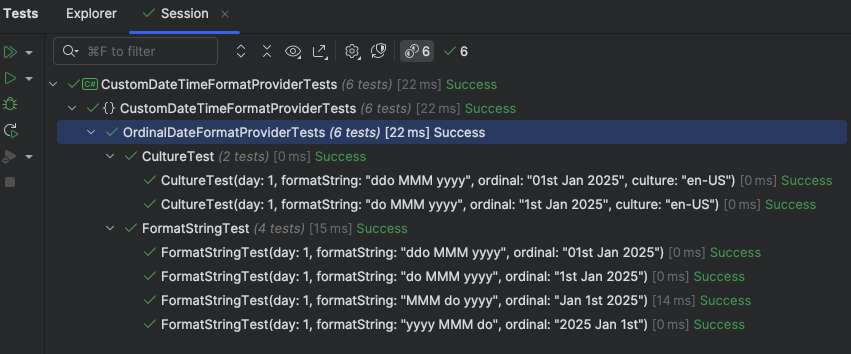Adding Ordinal Support To DateTime Format Strings In C# & .NET
[C#, .NET]
In the last two posts, we looked at how to handle the display of ordinal numbers in C# & .NET.
As a recap, the following code:
foreach (var date in dates)
{
Console.WriteLine($"- {date.Day.Ordinalize()} {date:MMM} {date:yyyy}");
}
Produces the following output.
- 1st Aug 2025
- 2nd Aug 2025
- 3rd Aug 2025
- 4th Aug 2025
This is a bit clunky, so Humanizer has an extension method directly on the DateTime - ToOrdinalWords()
Given our sample data is made up of DateOnly types, we must first convert them to DateTime.
DateOnly[] dates = [
new DateOnly(2025, 8, 1),
new DateOnly(2025, 8, 2),
new DateOnly(2025, 8, 3),
new DateOnly(2025, 8, 4)
];
foreach (var date in dates)
{
Console.WriteLine($"- {date.ToDateTime(TimeOnly.MinValue).ToOrdinalWords()}");
}
This will print the following:
- 1st August 2025
- 2nd August 2025
- 3rd August 2025
- 4th August 2025
This is fine, but this is locale-aware, and my current locale happens to be en-KE, which is loosely based on en-GB.
If we run the code under the en-US culture:
// Change culture to en-US
CultureInfo.CurrentUICulture = new CultureInfo("en-US");
foreach (var date in dates)
{
Console.WriteLine($"- {date.ToDateTime(TimeOnly.MinValue).ToOrdinalWords()}");
}
The results now look like this:
- August 1st, 2025
- August 2nd, 2025
- August 3rd, 2025
- August 4th, 2025
Note this is different from the previous display.
You may want to control exactly where the ordinal appears in the output.
Basically, the challenge here is that using the Humanizer ToOrdinalWords() method, the control of the ordinal day display is out of your hands.
To get around this problem, you have two options:
- Format the day component yourself, as we did in the previous posts
- Create a custom format provider
The latter option is more flexible, as you can place the ordinal wherever you want in the resulting string.
To create a custom format provider, you implement two interfaces, IFormatProvider and ICustomFormatter
These will require the implementation of two methods, Format and GetFormat, and we will bake in support for DateOnly and DateTime.
The resulting implementation will look like this:
using System;
using System.Globalization;
public class OrdinalDateFormatProvider : IFormatProvider, ICustomFormatter
{
private readonly IFormatProvider _baseProvider;
public OrdinalDateFormatProvider() : this(CultureInfo.CurrentCulture)
{
}
public OrdinalDateFormatProvider(IFormatProvider baseProvider)
{
_baseProvider = baseProvider;
}
public object GetFormat(Type? formatType)
{
ArgumentNullException.ThrowIfNull(formatType);
if (formatType == typeof(ICustomFormatter)) return this;
return _baseProvider.GetFormat(formatType)!;
}
public string Format(string? format, object? arg, IFormatProvider? formatProvider)
{
return arg switch
{
DateTime dt => FormatDate(dt, format),
DateOnly dOnly => FormatDate(dOnly, format),
_ => arg is IFormattable f ? f.ToString(format, _baseProvider) : arg?.ToString() ?? string.Empty
};
}
private string FormatDate<T>(T date, string? format) where T : IFormattable
{
format ??= "G";
if (format.Contains('o'))
{
int day = date switch
{
DateTime dt => dt.Day,
DateOnly dOnly => dOnly.Day,
_ => throw new InvalidOperationException()
};
var daySuffix = day.GetDaySuffix();
var innerFormat = format.Replace("o", $"'{daySuffix}'");
return date.ToString(innerFormat, _baseProvider);
}
return date.ToString(format, _baseProvider);
}
}
With this in place, we can write format strings like this:
| Format String | Result |
|---|---|
| do MMM yyyy | 1st Jan 2025 |
| MMM do yyyy | Jan 1st 2025 |
| yyyy MMM do | 2025 Jan 1st |
| ddo MMM yyyy | 01st Jan 2025 |
The o here is the format string we have introduced for ordinal.
We can then write some tests to verify everything works well.
[Theory]
[InlineData(1, "do MMM yyyy", "1st Jan 2025")]
[InlineData(1, "MMM do yyyy", "Jan 1st 2025")]
[InlineData(1, "yyyy MMM do", "2025 Jan 1st")]
[InlineData(1, "ddo MMM yyyy", "01st Jan 2025")]
public void FormatStringTest(int day, string formatString, string ordinal)
{
var date = new DateOnly(2025, 1, day);
var result = string.Format(new OrdinalDateFormatProvider(),
$"{{0:{formatString}}}", date);
result.Should().Be(ordinal);
}
[Theory]
[InlineData(1, "do MMM yyyy", "1st Jan 2025", "en-US")]
[InlineData(1, "ddo MMM yyyy", "01st Jan 2025", "en-US")]
public void CultureTest(int day, string formatString, string ordinal, string culture)
{
var date = new DateOnly(2025, 1, day);
var result = string.Format(new OrdinalDateFormatProvider(new CultureInfo(culture)),
$"{{0:{formatString}}}",
date);
result.Should().Be(ordinal);
}
These should pass successfully.

TLDR
We have implemented a custom formatter to allow specification of ordinals in DateOnly and DateTime.
The code is in my GitHub.
Happy hacking!